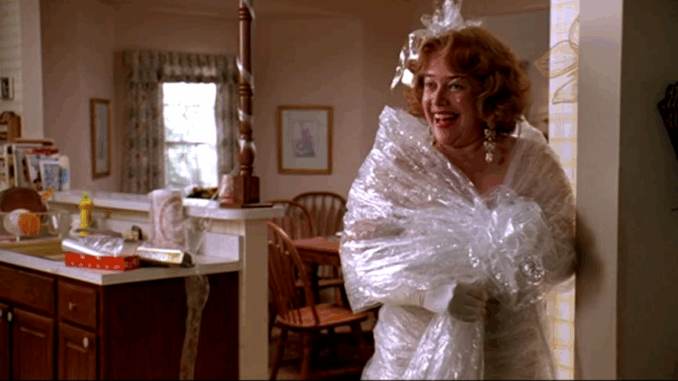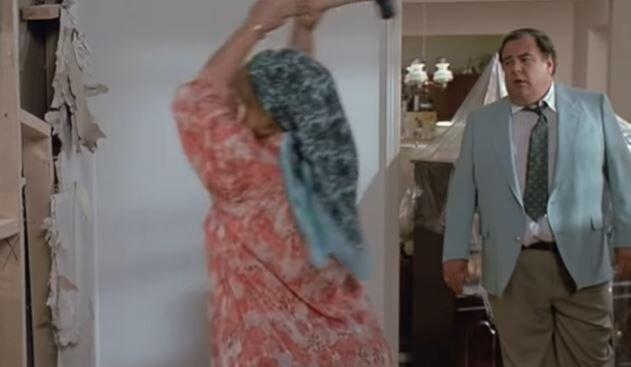
A Familiar Scene Turns Awkward
In Fried Green Tomatoes, Evelyn Couch’s story is a modern counterpoint to the flashback-laden tales of Idgie and Ruth. As Evelyn listens to Ninny Threadgoode’s stories in the present-day nursing home, she begins to examine her own life—a routine of passive obedience, repressed anger, and emotional starvation. Nowhere is this clearer than in the painful yet liberating scene of Evelyn’s breakup dinner with her husband, Ed.
The restaurant is dimly lit and impersonal, the kind of place Evelyn and Ed might have visited hundreds of times. Their table is small and tucked away, but Ed barely notices her as he reads the menu and mutters complaints about cholesterol, meat prices, and “weirdos” on the street. Evelyn sits across from him, dressed with care, holding herself with unfamiliar dignity. She has something to say.
As the waiter takes their order, Evelyn surprises herself by asking for something bold: prime rib, mashed potatoes, and extra gravy. It’s not a salad. It’s not sugar-free. It’s not her usual submissive choice. It’s comfort. It’s real. It’s her reclaiming her hunger—for food, for life, for something more.
Ed’s Indifference and the Final Straw
Throughout dinner, Ed barely looks up. He doesn’t notice Evelyn’s new haircut or the fact that she’s wearing lipstick for the first time in years. He speaks to her as if she’s an appliance malfunctioning. When Evelyn finally broaches the subject of needing space, of feeling unappreciated, Ed scoffs.
“Is this about menopause again?” he says, half-joking, fully dismissive.
This is the moment Evelyn realizes she’s talking to a wall, not a partner. Everything she’s been discovering about herself through Ninny’s stories—her need to be seen, to be valued, to be free—collides with Ed’s habitual disregard. Her decision doesn’t come from rage or impulse. It comes from clarity.
She doesn’t shout. She doesn’t cry. She simply puts down her fork and says, “Ed, I think we should live separately for a while.”
A Woman Choosing Herself

Ed chokes on his dinner roll. “You’re leaving me? For who? What the hell’s gotten into you?”
And Evelyn smiles—not smugly, but peacefully. “For me. What’s gotten into me is me.”
This line, simple yet profound, is Evelyn’s declaration of independence. In choosing herself, she’s stepping into the lineage of women like Idgie and Ruth—women who didn’t wait for permission to live authentically.
This moment may not involve a train, a courtroom, or a fistfight, but it is just as radical. Evelyn is a woman in midlife, once invisible to the world, now demanding to be seen. And she does it not with violence or spectacle, but with resolve.
The Aftermath: A Quiet Revolution
Later that evening, Evelyn returns to her car alone. There’s no dramatic music, no applause. But everything has changed. She doesn’t cry. She doesn’t doubt. She simply drives—away from Ed, away from years of being ignored, and toward a future she hasn’t yet imagined but knows she deserves.
In the coming scenes, we see her slowly rearranging her life: painting the living room, taking self-defense classes, reconnecting with old dreams. The changes are small, almost mundane. But they mark a seismic shift in identity.
She no longer waits to be validated. She no longer blames herself for Ed’s coldness. And she no longer lives on the periphery of her own life.
Parallels with the Past
This breakup dinner mirrors Idgie’s most powerful moments—when she chooses Ruth over respectability, when she chooses truth over fear. Evelyn isn’t born wild like Idgie, but she learns that wildness doesn’t have to look like rebellion. Sometimes, it looks like a quiet goodbye. Sometimes, it’s a simple “no more.”
What Ninny gave Evelyn through storytelling wasn’t just escape—it was a mirror. Evelyn saw pieces of herself in Ruth’s quiet strength, in Sipsey’s wisdom, in Idgie’s bravery. And by the time she finishes her dinner alone, she’s writing her own story.
Conclusion: The Power of Saying Enough
Evelyn’s breakup dinner may be one of the least flashy scenes in Fried Green Tomatoes, but it is among the most important. It is a lesson in self-respect, in courage, and in the power of no longer shrinking.
She doesn’t need Ed to understand. She doesn’t need anyone’s permission. She chooses herself. And in that moment, Evelyn Couch becomes the hero of her own story.
As she walks away from the restaurant, the audience understands something deeply universal: sometimes the boldest revolutions are quiet. Sometimes freedom is found not in the noise of protest, but in the stillness of a woman who finally knows her worth.
